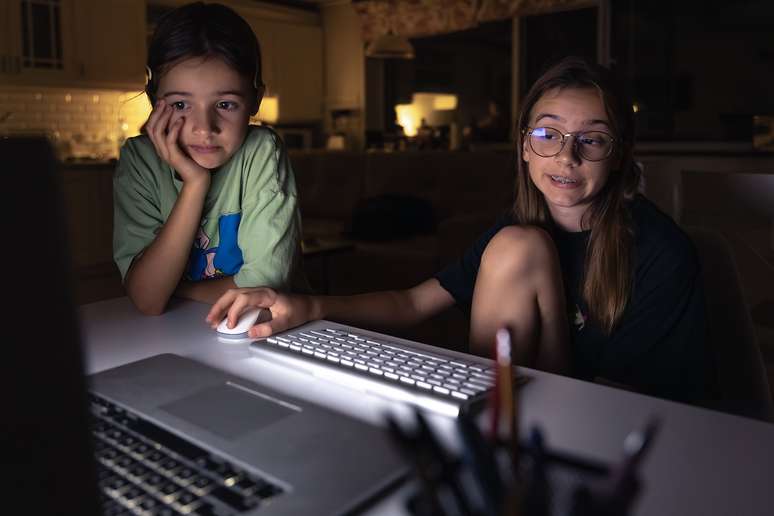Alarm for parents and teachers reveals: the increase in the use of electronic devices among children directly affects the development of the child. Among the screens there are notebooks, cell phones, tablets, objects widely used by everyone. And, in recent years, it is undeniable that the use of electronic devices has become a constant in children’s lives. Although screens can provide entertainment […]
The notice for parents and teachers reveals: The increase in the use of electronic devices among children directly affects child development
Screens are notebooks, cell phones, tablets, objects widely used by everyone. And, in recent years, it is undeniable that the use of electronic devices has become a constant in children’s lives. While screens can provide entertainment and learning opportunities, their excessive use can cause serious harm to children’s development.
Studies conducted by experts warn that it is essential that parents and educators are aware of the risks associated with this behavior.
Screens for children
Recent data from the Brazilian Society of Pediatrics indicates that children under 2 years old should not be exposed to screens, while children between 2 and 5 years old should have screen time limited to a maximum of 1 hour per day.
The negative impact
For pediatrician Dr. Ricardo de Abreu (@pediatriahumanizada), if the dangers of screens were previously suspected, with little scientific information, after the pandemic, where we have experienced great isolation, the impacts of the excessive use of devices with greater clarity.
Studies prove it
“Many reviews have been carried out on the topic, in different countries and in different age groups, but the conclusions have always been similar: screen use impairs speech, sleep quality, social interaction, concentration , working memory, increases anxiety and contributes to childhood obesity, because these children no longer do physical activity to look at screens”, explains the expert.
According to Dr. Ricardo, it is important to underline that in these studies a comparison was made between different types of screens, however television and video games did not cause any harm, other than the loss of quality of sleep.
In other words, studies have shown that the “big bad” is actually hand-held screen media, i.e. cell phones and tablets.
The pediatrician warns that, as tempting and convenient as it may be, it is essential to take screens out of children’s hands. Recognizes that there are different realities, such as the lack of a support network and the home officewhich often leads to children being distracted by devices and allows those responsible for the child to have more time to dedicate to work.
“It is important, as tempting and convenient as it may be, to remove screens from our children. In the long term, these momentary solutions we find to distract children will not be worth it,” warns the pediatrician.
Remember: parents are an example
Dr. Ricardo points out that children often replicate their parents’ habits, making it necessary for adults to reflect on the example they set. According to him, families should be formed through coexistence, dialogue, authentic bonds and play. He also warns that seemingly “innocent” use of technology can make children more agitated, sleep less and have difficulty concentrating.
«We need to control ourselves, take back the role of reading models, instead of being examples of evenings or meals with the cell phone in hand. Families are formed through socialization and conversation, authentic bonds, mutual interest and play. The use is initially ‘innocent’, it will make the child more stimulated, more agitated, with fewer interruptions in sleep and concentration.”
This behavior, in turn, can lead to children being more difficult to manage or using technology as a form of distraction, thus perpetuating a vicious and harmful cycle.
Recommendations:
- It is recommended to limit screen time, prioritizing outdoor activities and face-to-face social interactions;
- The most important thing is to encourage games that involve creativity and active learning, i.e. reading, board games and sports activities;
- It is necessary to create a family environment in which digital disconnection is encouraged, this means encouraging more moments of coexistence without electronic devices.
Source:
Dr. Ricardo de Abreu, pediatric intensive care physician from the Federal University of São Paulo; Pediatrician at the Faculty of Medicine of the ABC, Coordinator of the specialization internship in pediatrics and of the degree in Pediatric Emergencies at the Faculty of Medicine of the ABC; CEO of Clínica Sendo Criança – Clinic specializing in welcoming, inclusive and humane care
Source: Terra
Ben Stock is a lifestyle journalist and author at Gossipify. He writes about topics such as health, wellness, travel, food and home decor. He provides practical advice and inspiration to improve well-being, keeps readers up to date with latest lifestyle news and trends, known for his engaging writing style, in-depth analysis and unique perspectives.









